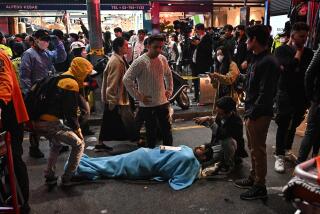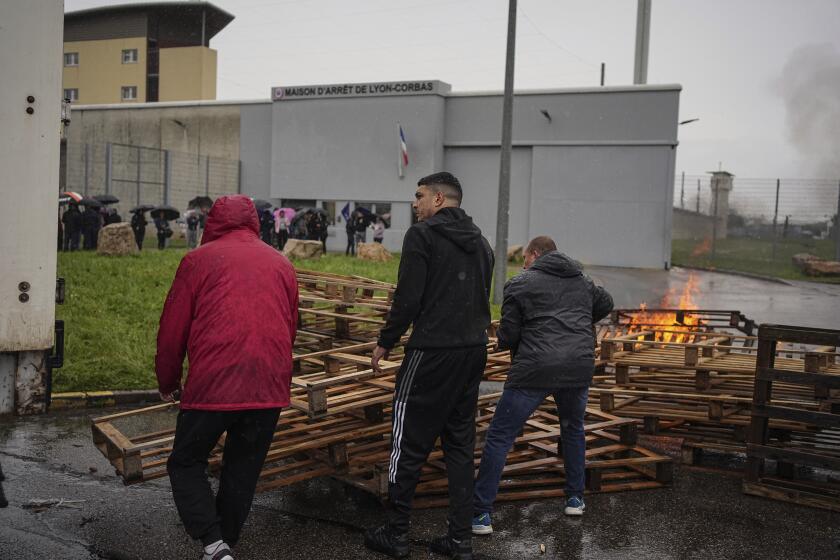Lack of Headway on Insurgency Bedevils Aquino’s Social, Economic Plans
Seven months after the February revolution some observers in Manila say that the honeymoon is over. Aside from the problems with the Marcos loyalists, the Muslim rebels, the communist-led New People’s Army, the old politicians, the Constitutional Commission, the International Monetary Fund and a plundered and bankrupt economy, President Corazon Aquino has had to deal with increasing criticism and opposition from the military and from her own national-defense minister.
The scare headlines carry ominous warnings of a coup, and Cardinal Jaime Sin has found it necessary to throw his not-inconsiderable weight behind Aquino while suggesting that her ministers keep their disagreements to themselves.
The main issue that has divided the cabinet is the communist-led insurgency and how to deal with it. Seventeen years of military action against it have succeeded only in antagonizing the civilian population and strengthening the appeal of the NPA, whose numbers grew from a few hundred in the early 1970s to perhaps 20,000 now .
It is widely believed that a large proportion of the NPA fighting men are not ideological Marxists but simply angry farmers who perhaps can be attracted back to the mainstream of national life by a policy of social justice and reconciliation. Hence Aquino decided to test the possibilities of making peace. She released the political prisoners held by the Marcos regime, and proposed a cease-fire and negotiations with the New People’s Army.
But things have not gone as she hoped. The cease-fire talks have been slow in getting started, and the communists seem determined to gain maximum political advantage from them. Relatively few NPA members have come down from the hills. And the killing continues--even the killing, by their own comrades, of NPA members suspected of being spies. The ambushing of military units also continues in some areas.
The president’s patience finally has worn thin, and she is hinting at returning to a military approach or of initiating negotiations locally with regional commands--something that the communists seem to fear, as it might well reveal divisions within their own ranks.
The casualties have not, of course, gone over well with the armed forces. They hurt, they feel their honor affronted and they feel frustrated when told by their president to hold back from pursuit of the NPA. The young officers who rose to prominence in the February revolution are men of professional pride and highly intelligent; they believe that they know more about fighting communists than any civilian does, and that they now have a special role as guardians of the nation.
The danger now is less that of a coup soon than of polarization and paralysis that could prevent the government from moving forward and attacking the basic problems at the root of the insurgency--poverty and inequality. Certainly since February much of the revolutionary momentum has been lost, and many with vested interests have regained their confidence and begun to reassert their claims.
Many of those who fought hardest to oust Ferdinand E. Marcos feel that the job is now done and that they can relax. Business people, frightened by the divisions within the cabinet and by the specter of a free and aggressive labor movement, are not investing. The new constitution will not be the instrument for automatic change that many people had hoped it would be; it will probably be long on the rhetoric of social justice, but implementation will have to await the pleasure of a legislature yet to be elected. Meanwhile, the communists will be waiting in the wings, hoping to capitalize on the people’s frustration and disappointment.
But the only way to go is ahead through the long and draining process of getting a constitution approved, a legislature elected and the rest.
In all this Aquino can count, so far, on the support of the overwhelming majority of the people. An opinion survey conducted in May indicated that she had general approval not only of her presidency but also of particular policies such as reconciliation with the rebels and the Marcos loyalists. She will probably have equally strong support if she now turns to stronger measures.
The effectiveness of “red scare” propaganda demonstrates how little real support there is for communism among the people. The military knows very well that it has no mandate to take over, and that any attempt to do so would mean facing an outraged citizenry. Some of the wealthy and the business class are awakening to the situation and are beginning to search for solutions to the misery that they see around them; plantation owners on the island of Negros, for example, are working on schemes for sharing the land with their workers.
The Roman Catholic bishops remain among Aquino’s strongest, but not uncritical, supporters. Some of them are active in the effort at negotiations with the New People’s Army, and have been among the most insistent in asking for clear guidelines and policies for the reintegration of returnees. In an August pastoral letter the bishops called for 100 days of prayers and penance for the success of the Constitutional Commission and a happy resolution of the nation’s problems.
Privately, too, representatives of the national Bishops’ Conference have pointed out other problem areas in Aquino’s administration. They, like most of the Filipino people, desperately want her to succeed, for, although the euphoria of February has passed, they see in Aquino the last best hope for the nation--the last alternative, perhaps, to a fate like that of El Salvador.
More to Read
Start your day right
Sign up for Essential California for news, features and recommendations from the L.A. Times and beyond in your inbox six days a week.
You may occasionally receive promotional content from the Los Angeles Times.






